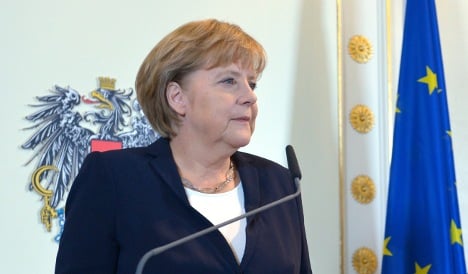“The ECB made clear yesterday … that the the future of the euro will to a large extent be determined by political action and that the conditionality is a very important aspect,” Merkel said in Austria. “That is the way we have always chosen.”
Finance Minister Wolfgang Schäuble said on Friday the European Central Bank (ECB) was not financing sovereign debt with its newly-announced plan to buy sovereign bonds of struggling eurozone members.
“It’s not the beginning of monetary financing of sovereign debt,” Schäuble told reporters in Stockholm, bashing the German media as “very nervous” in its criticism of the ECB’s decision on Thursday.
At one of the most highly anticipated meetings in its history, the ECB’s governing council agreed on a new programme to buy unlimited amounts of heavily indebted countries’ sovereign bonds in a bid to bring down their borrowing costs.
Schäuble, who was in Stockholm for a seminar on economic growth, defended the ECB’s independence, recalling that “as a finance minister, you never comment decisions of the ECB.”
“We have an independent European Central Bank and we trust this central bank,” he said, adding: “If the European Central Bank is a tool for policymakers, then the battle is lost.”
“The ECB is responsible for monetary policy, and the mandate of the ECB is clearly limited to monetary policy. And the decision that the ECB takes is in the framework of monetary policy, nothing else. It’s fine. They know very well what they have to do,” he stressed.
“We have an independent European Central Bank and we trust this central bank,” he said, adding: “If the European Central Bank is a tool for policymakers, then the battle is lost.”
“The ECB is responsible for monetary policy, and the mandate of the ECB is clearly limited to monetary policy. And the decision that the ECB takes is in the framework of monetary policy, nothing else. It’s fine. They know very well what they have to do,” he stressed.
European leaders broadly welcomed the bond-buying plan but Germany’s media lashed out at it, echoing the German central bank’s criticism.
Schäuble accused the media of sensationalising the issue, saying: “It’s good for the headlines.”
He addressed sceptics who argue that the ECB risks going too far and losing control of inflation since it did not set a monetary limit on its purchases.
“There are misunderstandings … If they announced any amount, or whatever, that would allow speculation,” he said.
Meanwhile, Schäuble recalled that eurozone governments had to reform their way out of the crisis, stressing the need to increase competitiveness.
“You can only overcome the crisis by solving the problems at the root… It’s not a matter of not enough solidarity,” he said in a response to a question about whether Germany would be ready to fork out more money to help troubled eurozone members.
He also said too much focus was being placed on the eurozone.
“Markets can only think of one problem at a time”, and if the eurozone crisis were resolved, “I’m sure they would find another problem to be very worried about.”
AFP/jcw



 Please whitelist us to continue reading.
Please whitelist us to continue reading.
Member comments